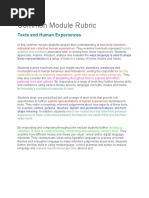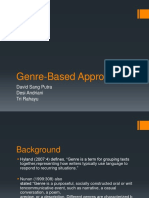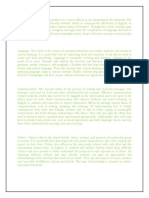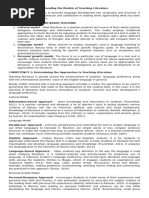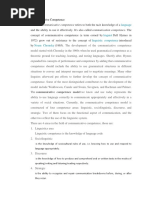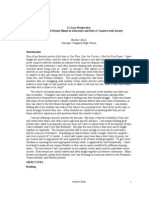Common Module Module
Common Module Module
Uploaded by
amina.abdullahCopyright:
Available Formats
Common Module Module
Common Module Module
Uploaded by
amina.abdullahCopyright
Available Formats
Share this document
Did you find this document useful?
Is this content inappropriate?
Copyright:
Available Formats
Common Module Module
Common Module Module
Uploaded by
amina.abdullahCopyright:
Available Formats
Common Module – Texts and Human Experiences
In this common module students deepen their understanding of how texts represent
individual and collective human experiences. They examine how texts represent
human qualities and emotions associated with, or arising from, these experiences.
Students appreciate, explore, interpret, analyse and evaluate the ways language is
used to shape these representations in a range of texts in a variety of forms, modes
and media.
Students explore how texts may give insight into the anomalies, paradoxes and
inconsistencies in human behaviour and motivations, inviting the responder to see
the world differently, to challenge assumptions, ignite new ideas or reflect personally.
They may also consider the role of storytelling throughout time to express and reflect
particular lives and cultures. By responding to a range of texts they further develop
skills and confidence using various literary devices, language concepts, modes and
media to formulate a considered response to texts.
Students study one prescribed text and a range of short texts that provide rich
opportunities to further explore representations of human experiences illuminated in
texts. They make increasingly informed judgements about how aspects of these
texts, for example context, purpose, structure, stylistic and grammatical features, and
form shape meaning. In addition, students select one related text and draw from
personal experience to make connections between themselves, the world of the text
and their wider world.
By responding and composing throughout the module students further develop a
repertoire of skills in comprehending, interpreting and analysing complex texts. They
examine how different modes and media use visual, verbal and/or digital language
elements. They communicate ideas using figurative language to express universal
themes and evaluative language to make informed judgements about texts. Students
further develop skills in using metalanguage, correct grammar and syntax to analyse
language and express a personal perspective about a text.
You might also like
- Unit 7 English Debate Year 5 6 1Document17 pagesUnit 7 English Debate Year 5 6 1api-248888410No ratings yet
- Teaching LiteratureDocument8 pagesTeaching LiteratureFlorina Kiss89% (9)
- Translingual Pedagogical Perspectives: Engaging Domestic and International Students in the Composition ClassroomFrom EverandTranslingual Pedagogical Perspectives: Engaging Domestic and International Students in the Composition ClassroomJulia KiernanNo ratings yet
- Common Module RubricDocument1 pageCommon Module Rubricclaire doNo ratings yet
- Stage 6 English Adv Modules - NSW Education StandardsDocument2 pagesStage 6 English Adv Modules - NSW Education StandardslpcrofftNo ratings yet
- Rubric + 2020 Sefton Analysisof EulogyDocument12 pagesRubric + 2020 Sefton Analysisof Eulogychristina.lee1404No ratings yet
- English Advanced Stage 6 Syllabus 2017Document4 pagesEnglish Advanced Stage 6 Syllabus 2017Srinidhi sivaNo ratings yet
- Year 11 Common ModuleDocument1 pageYear 11 Common ModuleTashna LalNo ratings yet
- Texts and Human Experience Lesson 1Document8 pagesTexts and Human Experience Lesson 1KitKatKNo ratings yet
- Year 8 English Scope and Sequence 2023Document7 pagesYear 8 English Scope and Sequence 2023ben.kilbyNo ratings yet
- Lang and Lit-3-11Document10 pagesLang and Lit-3-11edua.toth-csernusNo ratings yet
- English Advanced Year 11 Stories of Speculation Resource 3 Module A Syllabus RubricDocument2 pagesEnglish Advanced Year 11 Stories of Speculation Resource 3 Module A Syllabus Rubrickzhong1No ratings yet
- Lang and Lit-3-11Document9 pagesLang and Lit-3-11edua.toth-csernusNo ratings yet
- Year Level DescriptionDocument10 pagesYear Level Descriptionapi-353573817No ratings yet
- Year 11 2014 Area of Study Identity StudentDocument1 pageYear 11 2014 Area of Study Identity Studentapi-275699532No ratings yet
- English Common Module Notes - Year 12Document4 pagesEnglish Common Module Notes - Year 12LilyNo ratings yet
- Rubric PowerpointDocument9 pagesRubric Powerpointapi-391585129No ratings yet
- Genre-Based ApproachDocument10 pagesGenre-Based ApproachAminah RosaNo ratings yet
- Literature - Provider of Models, Iulia OstafiDocument5 pagesLiterature - Provider of Models, Iulia OstafiIulia OstafiNo ratings yet
- Breaking Down The Discovery RubricDocument3 pagesBreaking Down The Discovery Rubricapi-298185987No ratings yet
- English Book For Intermediate Part II KPKDocument375 pagesEnglish Book For Intermediate Part II KPKnazir ahmad48% (23)
- Chapter 2 Competency 1Document10 pagesChapter 2 Competency 1Elgie Mhy TercioNo ratings yet
- Learner PorfolioDocument12 pagesLearner PorfolioAnita ChaokeNo ratings yet
- Ela Curriculum Overview by GradeDocument4 pagesEla Curriculum Overview by GradeMERVE TÜRKNo ratings yet
- Utopias and Dystopias ProgramDocument9 pagesUtopias and Dystopias ProgramOrmo@NormoNo ratings yet
- Ac English Yr6 PlanDocument3 pagesAc English Yr6 PlanalannaNo ratings yet
- Genre Analysis in Second Language TeachingDocument3 pagesGenre Analysis in Second Language Teachingsundas ziaNo ratings yet
- ELReport 2 - 043257Document9 pagesELReport 2 - 043257fornosdorojdNo ratings yet
- To Infinity and Beyond Lesson TemplateDocument4 pagesTo Infinity and Beyond Lesson Templateapi-266921998No ratings yet
- Genre and Academic DiscoursesDocument3 pagesGenre and Academic DiscoursesFlor MedinaNo ratings yet
- Maam Carpio ReviewerDocument7 pagesMaam Carpio ReviewerBravo SixNo ratings yet
- Chapter 2 - ENG 120 HandoutsDocument7 pagesChapter 2 - ENG 120 HandoutsCarl JohnNo ratings yet
- English Work PlanDocument12 pagesEnglish Work PlanIzza De LunaNo ratings yet
- Mehraneh Alizadeh Reflection 1Document3 pagesMehraneh Alizadeh Reflection 1alizadehmehraneh450No ratings yet
- CP Bahsa IndonesiaDocument1 pageCP Bahsa IndonesiaSuripno S.Pd.No ratings yet
- Year 8 V 8.3: Receptive Modes (Listening, Reading and Viewing)Document1 pageYear 8 V 8.3: Receptive Modes (Listening, Reading and Viewing)Annie SNo ratings yet
- Course Syllabus - Grade 10Document5 pagesCourse Syllabus - Grade 10MaybellCapistranoNo ratings yet
- Course Syllabus - Grade 9Document7 pagesCourse Syllabus - Grade 9MaybellCapistranoNo ratings yet
- Year 4 Plan - Australian Curriculum: English: Source: Australian Curriculum, Assessment and Reporting Authority (ACARA)Document3 pagesYear 4 Plan - Australian Curriculum: English: Source: Australian Curriculum, Assessment and Reporting Authority (ACARA)Ngoc PhamNo ratings yet
- Tals ReviewDocument8 pagesTals ReviewJean BalaticoNo ratings yet
- Sample-Unit-Standard-Year-12-Common-Module-Past-The-Shallows 2Document13 pagesSample-Unit-Standard-Year-12-Common-Module-Past-The-Shallows 2mahla fzpoorNo ratings yet
- Chapter 13. Genre As Social Action: The Thinness of The Written SignDocument16 pagesChapter 13. Genre As Social Action: The Thinness of The Written SignEsther Pujakesuma NainggolanNo ratings yet
- I. Communicative Competence: LanguageDocument4 pagesI. Communicative Competence: LanguageLidya Setiasari0% (1)
- Module B: Critical Study of LiteratureDocument1 pageModule B: Critical Study of LiteratureZenaNo ratings yet
- 02 Rashidi Alihosseini Red PDFDocument7 pages02 Rashidi Alihosseini Red PDFsameh23kamalNo ratings yet
- SD-CurriculumOverview4-6Document2 pagesSD-CurriculumOverview4-6Demian NetoNo ratings yet
- 2024 Course OutlineDocument11 pages2024 Course Outlinekstjcb4tp5No ratings yet
- Faaas OkokDocument3 pagesFaaas OkokMAGNIFIQUE IDAHEMUKANo ratings yet
- Speaking TheoryDocument2 pagesSpeaking TheoryJael TudorNo ratings yet
- Othello Lesson 1Document2 pagesOthello Lesson 1Ormo@NormoNo ratings yet
- ATL-Lang A BriefDocument12 pagesATL-Lang A BriefJennifer WienNo ratings yet
- Bullis 09 HealthDocument16 pagesBullis 09 HealthAmit BhattacharyaNo ratings yet
- Writing in The EFL SituationDocument15 pagesWriting in The EFL SituationSimona SymonyciNo ratings yet
- A Guide To Introduce Literature in The English Language ClassDocument5 pagesA Guide To Introduce Literature in The English Language ClassRosalina RodríguezNo ratings yet
- Mini-Unit Plan Assignment Part A: Inquiry QuestionsDocument8 pagesMini-Unit Plan Assignment Part A: Inquiry Questionsapi-295355929No ratings yet
- Goals and Components of K To 12 English CurriculumDocument30 pagesGoals and Components of K To 12 English Curriculumperalesnovencidokyla100% (1)
- ECP27 Literature StandardsDocument10 pagesECP27 Literature StandardsGeegee SemanaNo ratings yet
- Stage 6 English Advanced Year 12 Common Module Sample UnitDocument21 pagesStage 6 English Advanced Year 12 Common Module Sample UnithelenNo ratings yet
- Discourse analysis applied to english language teaching in colombian contexts: theory and methodsFrom EverandDiscourse analysis applied to english language teaching in colombian contexts: theory and methodsNo ratings yet



